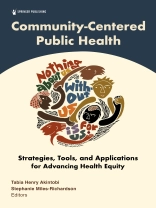Community-Centered Public Health provides students of public health and related health professions with the strategies, tools, and applications needed to build and deliver effective public health programs. This practical textbook emphasizes the importance of integrating community leaders throughout the program planning, implementation, evaluation, and dissemination processes, and of tailoring public health approaches based on culture, context, values, and the environment to advance health equity and improve population health. Community-Centered Public Health equips students with key frameworks, knowledge, skills, and an appropriate mindset for working with communities to deliver community-centered initiatives across public health domains.
This text delivers detailed discussions on the community engagement framework, community-centered public health principles, and the key considerations in defining community, establishing community governance, understanding the bidirectional process of leadership and mentorship, and community-centered program evaluation. Community-Centered Public Health also focuses on applications across policy, research, and community practice, community-based participatory research (CBPR), community public health crisis response and resilience, health communication and prevention marketing, and more, to inspire the next generation of public health and community leaders to consistently practice with their communities in mind.
Key Features:
- Chapters strategically coauthored by public health and community leaders with long histories of developing and sustaining equitable public health partnerships
- Includes engaging Case Studies, Vignettes, Audio interviews, Discussion Questions and real-world examples that shed light on best practices and foster critical thinking
- Shares lessons learned and impactful experiences from community and public health leaders working to improve population health and health equity on the frontlines
- Identifies specific, relevant Council on Education for Public Health (CEPH) Foundational Competencies in each chapter
- Qualified instructors have access to expanded Instructor Resources featuring a Sample Syllabus and an Instructor Manual with learning activities and discussion questions for each chapter, and additional resources to supplement students’ dynamic learning and interaction with the text
Tabella dei contenuti
Contributors
List of Audio Resources
Audio Contributors
Preface
Springer Publishing ConnectTM Resources
PART I. PRINCIPLES
Chapter 1. Defining the Community: Identity, Context, and Culture Matters
Chapter 2. Establishing Community Governance
Chapter 3. Public Health Leadership and Mentorship: For, With, and By Communities
Chapter 4. Community-Based Participatory Evaluation: Assessing the Outcomes and the Partnership
PART II. APPLICATIONS
Chapter 5. Community-Focused Public Health Research
Chapter 6. Understanding Community-Based Participatory Research (CBPR) Across Four Dimensions: Theory, Pedagogy, Research, and Praxis
Chapter 7. Community Engagement and Translational Research
Chapter 8. Health Policy: Processes, Alliances, and Strategies for Public Health Action
Chapter 9. Community-Oriented Healthcare Providers
Chapter 10. Community Public Health Crisis Response and Resilience
Chapter 11. Health Communication and Social Marketing Practice
Chapter 12. Implications for Advancing Health Equity: Minding Root Causes, Dismantling Systems, and Creating Solutions
Afterword
Circa l’autore
Stephanie Miles-Richardson, DVM, Ph D, is the founding Chair of the Department of Public Health Education at Morehouse School of Medicine (MSM). Dr. Miles-Richardson also serves as Associate Dean of the division of Graduate Education in Public Health and Director of the Master of Public Health Program.












